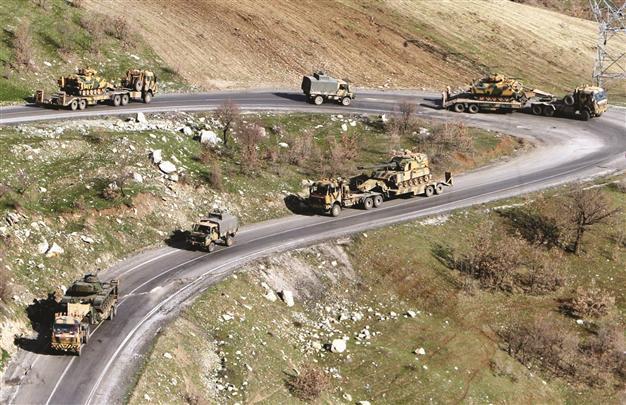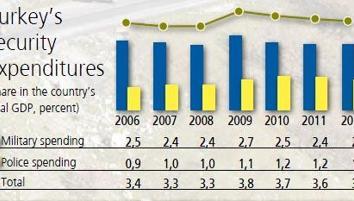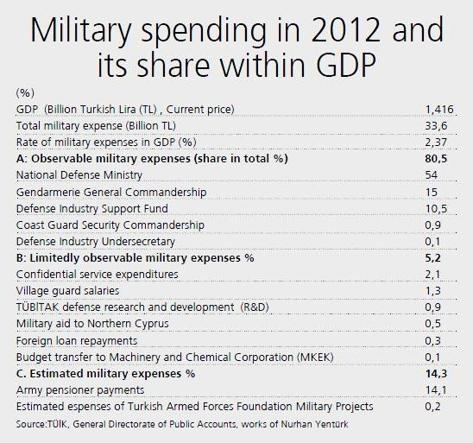Can the peace process cut the high security budget?
Mustafa Sönmez

The recent resolution process provides a potential for a decrease in soldier and police spending, which reached a total of 50 billion Turkish Liras ($27 billion) last year. DHA photo
Turkey’s military spending constitutes 4 percent of the country’s GDP. It might even reach 5 percent if confidential spending is added to that. If we retrench by 20 percent (one percentage point) it would be about 15 billion Turkish Liras ($8.3 billion). It is not a small amount, but it is not as much as to sweep us off,” says Professor Seyfettin Gürsel, an academic at Bahçeşehir University and an economy writer, in his column in daily Radikal on March 28.
Professor Asaf Savaş Akat, an academic at Bilgi University, also wrote about military spending in his column in daily Vatan on March 21. “It is even said that the 30-year cost of a war is $400 billion. Official annual military spending is 4 percent of the national income. It would reach 5 percent with the additions of confidential ones. To illustrate, a two-point austerity corresponds to 30 billion liras ($16.6 billion) annually. It is a considerable source. Remember that the total public investment in 2012 was 50 billion liras ($27.8 billion). If it is invested in infrastructure, for instance, there would be a 60 percent increase [in total public investment],” Akat says.
Is it really so? Is it really true that military spending constitutes 5 percent of national income? Secondly, will the [resolution] process decrease the military (and domestic safety) spending? The real extent of military spending always remains a “secret.” The claims written above are not based on any scientific research. The only entity conducting such studies is the Public Expenditures Monitoring Platform. A study led by Professor Nurhan Yentürk tries to shed light on the real aspects of public, military and domestic safety expenditures.
 How much spent?
How much spent? Yentürk, who conducts monitoring work at Bilgi University on military and domestic safety spending under the title of “nongovernmental organization activities,” states that only a certain part of the military spending could be fully monitored, while some portion of it could be relatively observed, and the rest could only be based on bare presumptions. From the database of the Finance Ministry’s General Directorate of Public Accounts, the spending of the Defense Ministry, gendarmerie, Defense Fund and Coast Guard Security could be monitored.
The total spending of these institutions is estimated about 27 billion liras ($15 billion) for 2012. Moreover, the secret service expenses that could be only limitedly monitored, the expenses of village guards, funds allocated to the Scientific and Technical Research Council of Turkey (TÜBİTAK) and the Mechanical and Chemical Industry Corporation (MKEK), the aid sent to North Cyprus and foreign military debt discharges correspond to 10 percent of the overall monitored spending, thus total military spending in 2012 reached nearly 30 billion liras.
When the spending of armed force foundations and pensions of retired military officers are added to this, the total spending reaches 34 billion liras ($18 billion) for 2012. This amount, which nearly constitutes 2.4 percent of national income, is almost half of the claimed rate of 5 percent.
The “Financial and Economic Data Relating to NATO Defense” issued on February 19, 2009 indicated that Turkey’s military spending for 2008 is $13.3 billion, while it has a 2 percent share in overall military expenditures of NATO. Turkey’s military spending for 2012 corresponds to $18.4 billion with the average exchange rate of the dollar. Doubtlessly, the lira’s excessive value gain has affected these results. Still, it would be good to remind that the claim saying that “the Turkish army is one of the strongest armies of NATO” is an exaggerated review.
Domestic safety expenditures should be also added to military spending, which constitutes about 2.5 percent of Turkey’s national income. The findings of Professor Nurhan Yentürk with regard to domestic safety showed that while police spending was below 1 percent of national income in 2006, it exceeded 1.1 percent in 2012, reaching approximately $9 billion. In other words, domestic safety expenditures cost at least half of the military spending, which is estimated to have cost $18.2 billion in 2012. And the total of these two is equal to 3.4 percent of Turkey’s national income.
What can be done? The recent resolution process has provided a potential for a decrease in soldier and police spending, which reached a total of 50 billion liras ($27 billion) according to 2012 prices. The most reasonable act is to decrease expenses from 3.5 percent of the national income to 1.5 percent, just like in most European countries. This would create at least $17 billion of resources. Anything can be done with these resources, including the things that could enrich the concept of the peace process, or an effectual land reform in southeast Turkey. Why not?
Especially in the southeastern provinces of Diyarbakır and Şanlıurfa, there is an unjust distribution of land, and landowners still dominate there. Where will Kurdish youth be employed when they leave the mountains? Is it possible to create a prosperous and peaceful future with the lands distributed to them and their families and the irrigation investments fulfilled with the resources provided by a retrench from military spending? I think it is possible.
However, the real question is “Could what is ‘possible’ be also ‘probable’?” In case of a cease-fire with the Kurdish movement, is a radical decline in military and domestic safety budget possible in the face of current and possible tensions with neighboring countries including Syria, Iran and Iraq? Unfortunately not. Even if peace can be achieved inside the country, the situation in the Middle East, especially relations with neighbors, decreases the possibility of cutting the military and domestic security spending of Turkey.
Turkey ranks 15 in military spending According to the data released by Swedish nongovernmental organization SIPRI on military expenditures in 2012, among the total military expenses in the world, which is $1.75 trillion, 39 percent belongs to the U.S., while China ranks second with 9.5 percent and Russia follows it with 5.2 percent.
Despite rapidly increasing their military expenditures after 2003, China and Russia still fall behind the U.S. Allocating 4.4 percent of its national income to military spending, the U.S. seems to have decreased its expenditures by 6 percent last year with the effect of the global crisis. With an $18.2-billion budget allocated to the military, Turkey ranks in the 15th place in the SIPRI Military Expenditure Database. However, SIPRI indicates that the United Arab Emirates, for which data was not available, would possibly be in 15th position in place of Turkey.


 How much spent?
How much spent? 